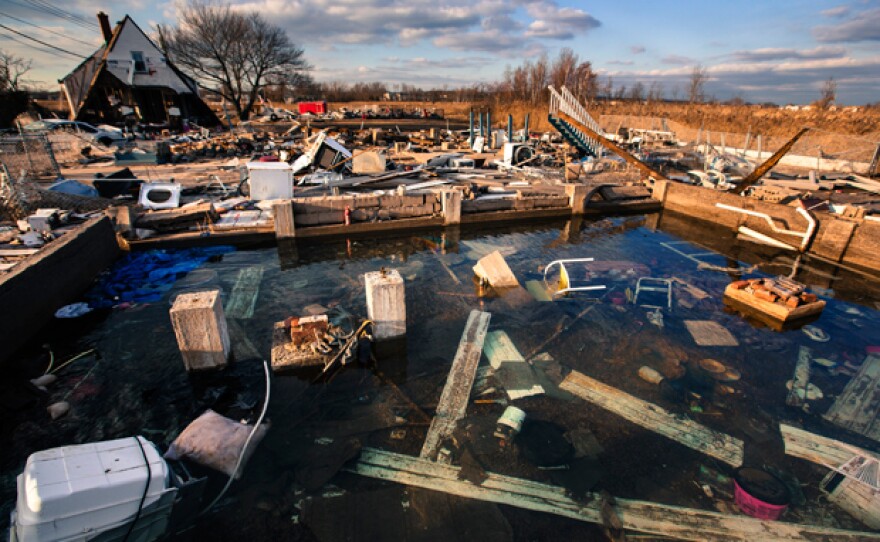Who profits when disaster strikes?
FRONTLINE and NPR have been investigating the answer to that question, focusing on the insurance companies that profited in the wake of Superstorm Sandy and the government agencies that were supposed to help people rebuild.
This major collaboration examines why three years after the storm, thousands of people are still not home — despite billions of dollars spent on recovery efforts.
"Business Of Disaster" reveals that private insurance companies working for the government have made hundreds of millions of dollars at the same time that thousands of homeowners are claiming they have been underpaid.
“We found that disasters like Superstorm Sandy aren’t a disaster for everyone,” says NPR reporter Laura Sullivan, who along with FRONTLINE producer Rick Young and his investigative team has spent the past year digging into how Sandy recovery dollars were spent.
“For some, disasters are big money. We saw thousands of storm survivors stuck in bureaucracy and red tape, insurance companies and contractors making millions in profit, federal aid not reaching homeowners – and government agencies admitting they failed in their efforts to help when people needed it most.”
The FRONTLINE and NPR investigation examines two key parts of the disaster recovery system — the federally backed flood insurance program, and the special housing aid Congress gives to local governments after major disasters — and the many complaints and problems that surfaced about them after the storm.
Through the documentary and radio reports, FRONTLINE and NPR show how rebuilding efforts have left disjointed communities — where some homes are elevated, some are rebuilt below sea level, and some remain destroyed – and expose lingering questions about the effectiveness and wisdom of America’s current disaster recovery system.
In an effort to understand the scope of the profits being made, the investigative team spent months collecting data on insurance company expenses and revenue, following a complex money trail.
The investigation explores allegations that insurance companies systematically underpaid thousands of homeowners on their flood insurance claims, and delves into how much the billions in housing aid sent to local governments like New York City is actually helping homeowners.
The program includes revealing interviews with the head of FEMA’s flood program, the head of disaster recovery at HUD, and the top official who oversaw Sandy housing recovery for New York City, as well as a top representative from the insurance industry and people who have worked for years in the disaster recovery business.
It’s an eye-opening collaboration that raises troubling questions about whether the government — and the communities it serves — are prepared for the next big storm.
Related Articles
Flood Insurance Program is Vulnerable to Fraud, Says N.Y. Attorney General by Priyanka Boghani
Night of the Storm by Patrick Torphy
How Federal Flood Maps Ignore the Risks Of Climate Change by Sarah Childress
Five Questions to Ask About Flood Insurance by Priyanka Boghani
Can FEMA’s Flood Insurance Program Afford Another Disaster? by Katie Worth
“Business of Disaster”: Behind the Numbers by Emma Schwartz
WATCH ON YOUR SCHEDULE:
Episodes of FRONTLINE become available for streaming on demand during each broadcast.
JOIN THE CONVERSATION:
FRONTLINE is on Facebook, Instagram, tumblr, and you can follow @frontlinepbs on Twitter. #frontlinePBS
CREDITS:
A FRONTLINE production with American University School of Communication's Investigative Reporting Workshop in collaboration with NPR. The writer, producer and director is Rick Young. The co-producers are Emma Schwartz and Fritz Kramer. The correspondent is Laura Sullivan. The executive producer of FRONTLINE is Raney Aronson-Rath.





